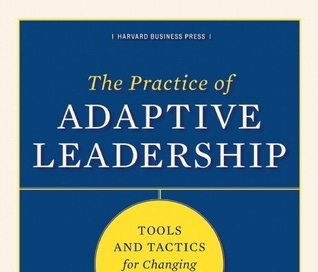I've been reading a really great book called The Practice of Adaptive Leadership by Ronald Heifetz, Marty Linksy, and Alexander Grashow (otherwise known as the Cambridge Leadership Associates). These three guys teach leadership in executive education programs at Harvard, New York University, and Duke Corporate Education, and unlike a lot of leadership authors I've read (and there have been many), they do a great job converging the theoretical with the practical in very readable prose. Two quotes and a couple thoughts from the first 25 pages:
“People love change when they know it is a good thing…What people resist is not change per se, but loss…Adaptive leadership almost always puts you in the business of assessing, managing, distributing, and providing contexts for losses that move people through those losses to a new place.” The Practice of Adaptive Leadership, p. 22-23
I tend to enjoy rather than dread change. This may surprise some who know me as a systematic thinker – an intuitive creative-type both logical and methodical in his art – but while I don’t consider myself particularly entrepreneurial, I get bored with the status quo. I tend to embrace change not for change’s sake but because there’s a problem that requires a new solution; as I like solving things, change then – regardless of what it is or entails – becomes an accepted and necessary means to resolution, no questions asked.
Megan, on the other hand, is addicted to change – she loves it and craves it (thankfully, she has yet to scratch the itch of being married to the same man for nearly thirteen years) and adjusts fairly well in the midst of it. I’m grateful for her flexibility, and have more than taken advantage of it by moving our family 9 times in the past 12 years.
Because of my temperament (which in the midst of change tends to be especially objective and detached, probably as a protection mechanism), I can forget about the loss that change often represents to others. I experienced this in the later years of our time with The Navigators, when every day of trying to turn an ailing ministry property around was full of change, and people’s unwillingness to accept it seemed ridiculous. Why would someone want to stay in a system that wasn’t working? Why resist change when the status quo was just that?
The answer I didn’t see then – partially blinded by zeal for what I was being asked to do, as well as by my age and experience up to that point – was that it wasn’t change people feared, but loss – of the familiar, of their control, of their identity. There’s a difference between causing change and being changed; most of us prefer the former to the latter.
“When your organization calls you a leader, it is rewarding you for doing what your authorizers want you to do…Adaptive leadership is not about meeting or exceeding your authorizers’ expectations; it is about challenging some of those expectations, finding a way to disappoint people without pushing them completely over the edge.” The Practice of Adaptive Leadership, p. 26
I recently had an experience in which I did something that, were it not for the politics involved, would normally have been affirmed and held high as an example by the leadership over me of what we as an educational entity are about. Instead, because of what I perceive to be equal parts fear and picking one’s battles, my actions were approved of (but not applauded), tolerated (but not endorsed), and largely ignored (but hardly forgotten). Honestly, I can’t deny my disappointment, but in a fit of maturity (and they don’t come too often), I suppose I understand.
I remember once – after experiencing a similar situation with different leadership over me – asking my director at the time if I was difficult to lead. I imagined that a response of “Well, sometimes, yes,” might help me understand why I struggled to toe the party line, especially in light of the politics of that situation. Strangely (to me, at least) the answer was “No,” which was also disappointing – in my pride, I thought I was more of a handful than he gave me credit.
The good news in both of these situations is/was that I have/had good leaders above me who do/did not react with knee-jerk force – they presumably saw my value, both as a person and employee, and did not try to lessen my contribution by censuring or firing me for my ideas and actions. The bad news is that I continue to wonder where the line is between being a “yes man” and being an adaptive leader willing to challenge my organization’s expectations of me for the sake of the greater good.
More thoughts to come, I'm sure. If you're looking for a book on leadership, this would be a good one.




